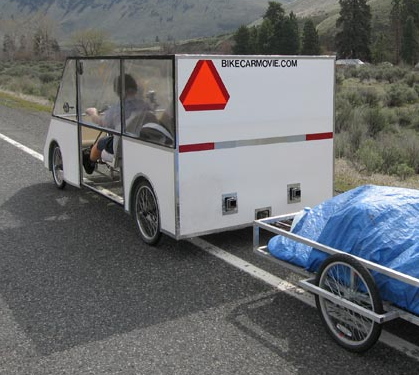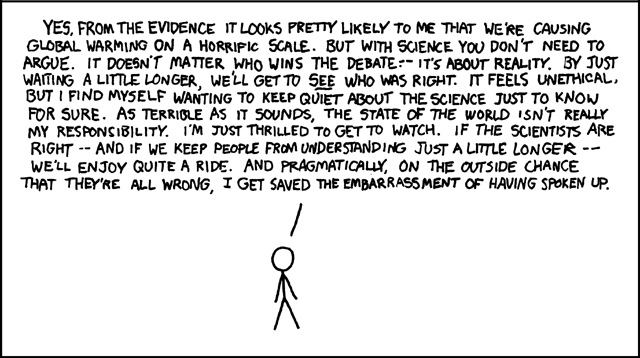 That’s the . Yes, he’s pedaling…and so are two guys in the back. It would be amusing to commute around the city in one of these. And it beats a Prius. Unless you measure it in miles per gallon of Gatorade.
That’s the . Yes, he’s pedaling…and so are two guys in the back. It would be amusing to commute around the city in one of these. And it beats a Prius. Unless you measure it in miles per gallon of Gatorade.
Global Warming Can Be Fun
Mike Stark, who seems to be absolutely fearless about confronting those who would blur the facts in favor of an agenda, has just posted a great narrative about showing up to a speech by Myron Ebell, a well-known shill for the anti-global-warming crowd. He got up to the mike and challenged the guy, not on the facts, but on his overall credibility.
That part of the story was interesting, but it was his thoughts on the argument process that were the real keepers:
You see, by calling his credibility into question immediately - and not letting him up for air - well, I’ve got no proof, but I really think that everyone in the room knew that Mr. Ebell had been bettered. When we ask policy or science questions of these charlatans, we give the impression that we care what they think. We don’t. We know they are rank liars, we’re just wondering if they’ll be able to spin a sufficient answer. But these guys get millions of dollars a year from the largest corporate titans precisely because they have the skill to ink up the issue. Why let them show off?
Worth the read.
After a long spell of work and contemplation, the last two weeks have been a whirlwind of meeting new people and doing interesting things.
Two weeks ago was GDC, which is normally a highlight of my year. This year, though, things were a bit tougher. To keep expenses down, I had scheduled a shorter-than-usual trip this year, and I stayed with a friend outside the city. And then I started in on a sinus infection on the way out on the plane. The result was a conference experience where I was there for shorter hours (because of the commute), fewer days, and with greatly decreased mental activity. For some sessions, I literally took notes without comprehending them. Nonetheless, I learned a few things and went to some inspiring sessions. Daniel James, Ernest Adams, and Clint Hocking gave great , among others. I got to present our Slidewalk game from the Boston Indie Game Jam at the Experimental Gameplay Workshop.
Last weekend was , an “un-conference” that self-organizes into groups of people who want to talk about and do cool stuff. It was fascinating — open source principles applied to the conference model. I was looking at the blackboard on Day 1 and noticed a hole…hopped on the conference IRC channel and asked if people were interested in a discussion / birds of a feather talk about Python. Got enough yes answers that I wrote it down in the box and about 25 people showed up. We had , people seemed to enjoy it.
Sunday I went back in for a tiny bit more BarCamp, but I was really interested in a meeting about the OLPC and in particular talking about game development for it. We had a great discussion about where to take this project and I’m very excited about it. I will try to talk about it at more length soon. If you’re interested in game development for the OLPC, please ping me — I’m trying to coordinate some of the energy around it.
Today I went to OpenCoffee Boston, which was organized by Nabeel and Bijan, who both blogged it hours ago. I’m SO 20th century in my response time.
But I have an excuse. I also had a couple of other meetings Tuesday and today that have gotten me very excited about Melting Point, which has been evolving in recent weeks. As I mentioned a couple of posts ago, I’ve decided to make a Flash-based downloadable web game, and I’ve now got the game design nailed along with most of the details of how the graphics will look, and I’m rapidly working through the software design. It’s going to happen, and I have multiple possibilities for publishing platforms.
And along the way I met a ton of interesting people.
 I met her at the Wired Next Fest.
I met her at the Wired Next Fest.
Imagine .
This is funny, weird, and sad, all at once. Click the pic for the full image.
 Damn, Skippy. This post was a double surprise.
Damn, Skippy. This post was a double surprise.
First, I hadn’t seen the news about the BBC game about global warming yet. It’s better than I thought it would be at first glance, but it’s also kind of predictable, and I found the gameplay to be fairly stilted. Although it seemed like they had the elements to make a game that could be fun, it felt rather scripted and uninteresting.
(The Sgt. Pepper-style ![]() look and feel doesn’t do it for me either, but that’s a matter of taste and I won’t presume to criticize it — I just don’t like it.)
look and feel doesn’t do it for me either, but that’s a matter of taste and I won’t presume to criticize it — I just don’t like it.)
It’s an interesting existence proof of a global warming game. And it scares the living shit out of me because that’s not what I’ve wanted to create.
Which is why I’ve been slashing at my game design for the last month or so trying to cut it down to the bare minimum. My initial design is a deep and detailed planetary sim, complete with lots of data and education about it, but without the artifacts of the “cards” this game uses. But as I’ve been implementing the prototypes, my BORING alert has been going off. I’ve been hoping that it’s a matter of game design and implementation — that I can polish in the fun — but I am growing more and more skeptical of that approach.
So I sat down one day and started designing the Global Warming Game for Museums. Given a classroom of kids in a room in a museum, what kind of interactive experience would they want to play?
And another time I wrote down a design for a card game. What if you didn’t have a computer? How would you play a game that teaches you something about global warming while you had fun?
In the last couple of weeks I’ve been working on a Flash game, in the same genre as the BBC one. What if you only wanted to play, in a web browser, for a few minutes? How would that sort of gameplay work out?
I think I have something. . It’s got some of the same elements as the BBC game but a faster style of gameplay, and it trusts you more to to be able to process the implications of the decisions you make. The worry, of course, is that it’s too much of a “gamer’s” game design, which might be bad for my target market. So I will probably work on making things more obvious — but I’d like to avoid the preachiness of the BBC game.
Which brings me to the second surprise of Nabeel’s post. Nabeel is a Boston-area entrepreneur whom I met last fall. I guess I’d say we’re more than Friendsters but not quite friends. His post fairly accuses most serious games of preaching to the choir. I’m not sure if I’m included in the group of people whose “chest-thumping earnestness” turns him off. I will confess that in the wild I am sometimes overcome by either the studied ennui of youth or the studied intransigence of “conservatives”, with the result that I will start thumping something, usually a table, and usually not with a shoe. But put my personal prophetic pecadillos aside — I am not my game.
His argument is that persuasive games are often too preachy and may not actually persuade. I think I agree, actually, which is why I’ve been emphasizing the concept of a fair “sandbox” in which to try out various global warming strategies. My theory is that if you give people a world to play in, they’ll figure out how to map it themselves.
 The IPCC report on climate change has been released, and it’s absolutely clear. Even the professional scientists who typically couch their words in lots of conditionals were as blunt as they ever get:
The IPCC report on climate change has been released, and it’s absolutely clear. Even the professional scientists who typically couch their words in lots of conditionals were as blunt as they ever get:
“The public should not sit back and say ‘There’s nothing we can do’,” said Achim Steiner, the executive director of the U.N. Environment Program. “Anyone who would continue to risk inaction on the basis of the evidence presented here will one day in the history books be considered irresponsible.”
So if you’ve been saying things like “it’s not caused by humans” or “there was a warm summer once” or “figs used to grow in England, you know, but it got too cold” (see the responses to Colin McEnroe’s ), just get over yourself, OK?
The only question left is what to do about it.
According to their website:
The Bulletin of the Atomic Scientists (BAS) is moving the minute hand of the Doomsday Clock on January 17, 2007, from 7 to 5 minutes to midnight.
BAS announced the Clock change at an unprecedented joint news conference at the American Association for the Advancement of Science in Washington, DC, and the Royal Society in London. In a statement supporting the decision to move the hand of the Doomsday Clock, the BAS Board focused on two major sources of catastrophe: the perils of 27,000 nuclear weapons, 2000 of them ready to launch within minutes; and the destruction of human habitats from climate change.
Emphasis mine.
If you haven’t heard of it before, the Doomsday Clock is intended to be a reminder of how close we are to the end of human civilization.
Fire and Ice
Some say the world will end in fire,
Some say in ice.
From what I’ve tasted of desire
I hold with those who favor fire.
But if it had to perish twice,
I think I know enough of hate
To say that for destruction ice
Is also great
And would suffice.— Robert Frost
 Today’s news:
Today’s news:
Exxon Cutting Ties to Global Warming Skeptics
Oil Giant to Join in Talks on Greenhouse Gas RulesBy TIMOTHY GARDNER
Jan. 12, 2007 — Oil major Exxon Mobil Corp. is engaging in industry talks on possible U.S. greenhouse gas emissions regulations, a move experts said could indicate a change in stance from the long-time foe of limits on greenhouse emissions.
Exxon, along with representatives from about 20 other companies, is participating in talks sponsored by Washington, D.C. nonprofit Resources for the Future. The think tank said it expected the talks would generate a report in the fall with recommendations to legislators on how to regulate greenhouse emissions.
Mark Boudreaux, a spokesman for Exxon, the world’s biggest publicly traded company, said its position on climate change has been “widely misunderstood and as a result of that, we have been clarifying and talking more about what our position is.”
I don’t think it was widely misunderstood. I think it was all too well understood, and they got caught.
 Wow. This is impressive.
Wow. This is impressive.
Sweden has a national plan to free itself from fossil fuels entirely by 2020. What will be particularly interesting is whether they can succeed without building additional nuclear plants, which is their stated intention.
Contrast this with our current “policy” in America:
Department of Energy (DOE) assistant secretary for energy efficiency and renewable energy David Garman has acknowledged that President George Bush plans to oppose efforts to include a national renewable energy requirement for utilities in Congress’ broad energy legislation.Noting that 18 states have already implemented renewable portfolio standards (RPS), Reuters said Garman asserted the administration’s belief that states are “best suited to craft [an RPS] that meets their needs.”
Additionally, Reuters reported that Garman testified before the U.S. House of Representatives’ Energy and Air Quality Subcommittee that Congress should include language in its energy bill that allows oil companies to drill in Alaska’s Arctic National Wildlife Refuge.
Reuters, Feb 15, 2005
